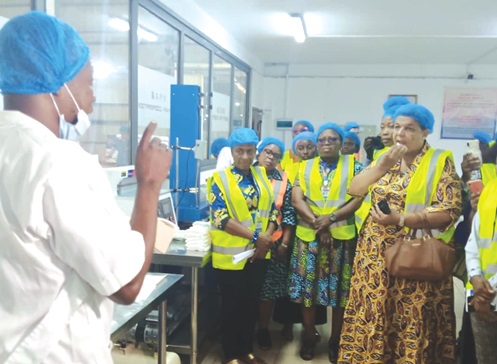
Tax break kick-off will reduce sanitary pad prices - Local manufacturers assure nation
Local manufacturers of sanitary pads have assured the public that the prices of the items will reduce once the zero tax policy on the product starts in January.
Advertisement
The Managing Director of Sunda Ghana Industry Park, Michael Ye, and that of Fay International, Jeanine Hage-Ali, who gave the assurance, expressed the hope that with the scrapping of the taxes, sales would increase and that would lead to the employment of more people.
The two executives gave the assurance last Monday when the opposition National Democratic Congress (NDC) Women's Caucus in Parliament paid a working visit to the factories of Sunda and Fay International, two of the local manufacturers in Accra, to assess what was happening at their production plant sites.
Caucus
The delegation was led by the Second Minority Chief Whip and First Vice Chairperson of the Caucus, Comfort Doyoe Cudjoe. Other members were the Member of Parliament (MP) for Awutu Senya West, Gizella Tetteh Agbotui, and the MP for Tempane, Lydia Lamisi Akanvariba.
They were also joined by student leaders from the University of Ghana and the Accra Technical University to assess the capacities of the factories and know whether they had the muscle to meet local demands.
Members of the caucus engaged in a frank discussion with the manufacturers on whether they had the capacity to meet the local demand since imported pads were expensive.
Production capacity, cost
The two factories have a yearly production output of 6.18 million pieces of the pads.
Sunda, the bigger of the two, produces six million pieces a year, while Fay produces about 183,000 a year, producing at 500 pieces a day.
The current country's demand, according to the companies, was between 350 million and 400 million pieces a year.
Currently, due to the high overhead costs especially at the ports, the companies had to cut down on their workforce, which had impacted on production numbers.
Engagement
The Second Minority Chief Whip and MP for Ada East asked if the companies had held any discussions with the government and its agencies as to how the process would be done.
The two MDs said there had been a prior budget engagement with the government, as well as the Association of Ghana Industries (AGI).
However, since the budget was presented to Parliament, the companies were yet to meet with the government about when the zero tax policy would take off for them to plan.
Ms Cudjoe said the caucus would continue to monitor to ensure that the "government walks the talk."
Background
The Minister of Finance, Ken Ofori-Atta, who presented the budget, said engagements with local manufacturers of sanitary pads revealed that there was adequate local capacity to produce far in excess of local demand.
Therefore, as part of efforts to boost the local industry, the 2024 budget proposed import duty waivers to be extended to cover imports of raw materials for the local production of sanitary pads, as well as zero-rating of VAT on locally produced pads.
The government said it was in discussions with the local manufacturers to ensure that the concessions reflected in the final price of the products on the market.
Currently, the manufacturers said they were burdened with Value Added Tax (VAT) and other levies amounting to 21.9 per cent on imported production materials at the ports of entry.




